#soft power
Text
MileApo and the rise of Thai soft power
Mile and Apo talking about the Thai period film at the Vogue Thailand Gala on 2022/9/21
I've been meaning to sit down and write about this for a while now, ever since I saw the pattern of Mile and Apo injecting it into their talking points about the 2023 historical film, but it's taken some an effort to actually lay it out. Hopefully the time I sat with it will make the it a more insightful, rich reading experience.
Disclaimers:
(1) I have no formal experience in international relations aside from reading and watching the news, but my strong point is research. Folks with a more formal backgrounds in policsci or IR are welcome to add their input!
(2) Comments about policies or political actions of nations, whether positive, neutral or negative, are not meant to reflect on private individuals of the nationality, even those with a notable amount of social-cultural capital. Private individuals, despite their positions of social influence, most often have little to no individual influence on a policy level**.
So without further ado:
What is soft power? (aka soft power for dummies)
Joseph Nye, a then-Harvard professor, coined the term soft power in the 1980s/early 90s. He described it as:
“A country’s ability to influence the preferences and behaviors of various actors in the international arena (states, corporations, communities, publics etc.) through attraction or persuasion rather than coercion.”
In his book Bound to Lead, Nye established that three prongs of a country's soft power were its culture, its political values, and its policies. Here are two different graphics that further break down what those look like when evaluating soft power in practice.
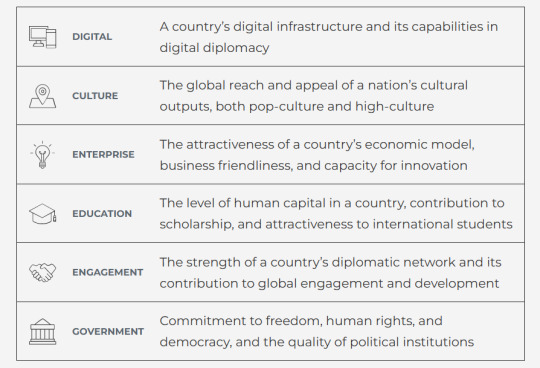
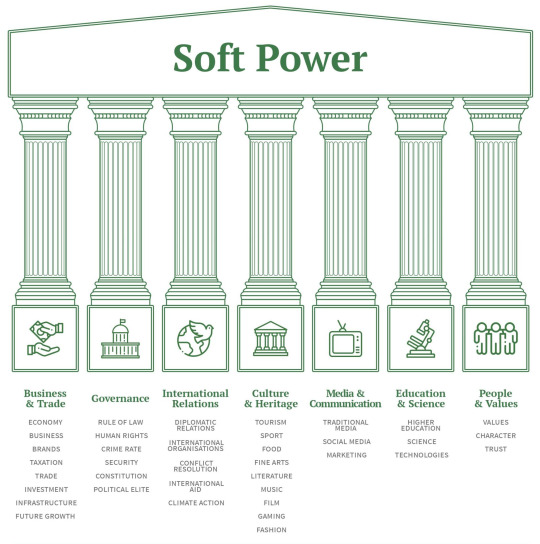
If you feel like all the above is still vague to the point of unparsable in an applied context, I spent the majority of the time researching how to demystify the term especially in the way MileApo discuss it, and found this great explainer:
A strong nation brand and positive soft power perceptions allow a nation to promote itself as a place for people to visit, invest in, and build a reputation for their quality of goods and services. [...] it is often overlooked that a strong nation brand and soft power can deliver better outcomes at home. Primarily it encourages domestic tourism, the consumption of domestic goods and services (rather than imports). Less tangibly it also just makes people feel better about their country.

Expressed in this context, soft power can be understood as the act of building trust in the cultural products of a nation domestically -- some more abstract in the form of art (music, film) and culture, some more concrete like products including fashion and beauty -- in a manner to appeal to its own citizens while also broadening the appeal of cultural goods abroad in a which can drive international tourism, trade, and commerce.
In other words: yes, our collective desire to actually taste Farmhouse bread.
The Thai government and the push for soft power
While my interest in this topic was originally piqued by MileApo's comments, soft power policy has to originate at the government level. Note again that Nye's definition of soft power is centered around "a country’s ability to influence", therefore soft power policy must always formally be expressed nationally.
Around the time MileApo consistently began promoting soft power in alignment with the period film, I noticed a slew of references in Bangkok Post, one of the reputable English online publications based in Thailand.
Back tracking through some of the articles as a reflection of national conversation, since 2020, there has been a consistent theme in terms of what the government is attempting and how well it's going (or not going):
On Thailand's soft power and positioning in the world, Feb 2020:
According to Kitti Prasirtsuk of Thammasat University, who has carried out extensive research into Thailand's branding and repositioning in the age of interconnectedness and social media, Thailand and its culture, values and foreign policy have charisma and high persuasive power which can attract admiration and cooperation. But the Thai people and bureaucrats must change their mindset and perceptions and appreciate their country in real terms first before they take up new challenges.
Within Asean, Thailand is behind Singapore as No.1 [among SE Asian soft power rankings]. The report stated that Thailand has the potential to rise into the top 30 in the world, if the country can strike the right political balance between the rural poor and urban elite. It went on to say that Thailand's weaknesses are problems related to corruption and inequality. It also said that the Thai government is failing to showcase the full potential of Thailand's rich cultural offerings beyond tourism. One more weak link is its poor performance in public diplomacy and digital infrastructure.
(Mile, Apo, and Bible all attended Thammasat University, which is considered one of the premiere universities in Thailand. Apo later transferred and graduated from a different university.)
On Milli, a Thai rapper who performed at Coachella in Spring 2022:
The presence of the 19-year-old rapper Milli at the Coachella Music Festival in the United States has reinvigorated Thailand's soft power ambitions -- an area the Thai government has not fully explored nor exploited. Milli, whose real name is Danupha Khanatheerakul, is the first solo Thai artist to perform at Coachella, a music festival that draws tens of thousands of fans annually.
[Milli's prescence at Coachella] was able to advance Thailand's soft power [in ways previously stalled]. It is not that the government is clueless about "soft power". For decades, governments have focused on presenting Thailand's soft power to the world. However, that iteration of "soft power" mainly consisted of Thai customs and traditions such as food, costume, classical dance, Buddhism rituals and the wai. These aspects of our cultural heritage, despite being charming to foreign tourists, are not sufficient to catapult Thailand's into a stronger position in the global market. Thai cultural heritage has failed to catch up in the digital age…
Milli's song also includes ideas relevant to international audiences. One of her songs openly discusses sexual consent. Being relevant is one of the keys to increasing the nation's presence among diverse populations. The cultural impact made by a young girl like Milli should make the government rethink its cultural promotion strategy. More support is needed for progressive Thai artists and innovators.
An opinion rebuttable on Milli's performance and the government's blundering of reaching for soft power while not meeting basic domestic requirements:
One of the minister's advisers belted out a long speech that did not seem to address how Thailand will become a "soft power" but used the term multiple times. One can't help but wonder if the ministry knows what it is doing, or what the so-called "soft power" it is espousing is about.
Milli's self-taunting line "I don't ride an elephant" may sound a bit old but her rapping about how "the country is good, people are good, our food is good but the government is bood," seems to have struck a chord. "Bood" means rotten in Thai. It is thus understandable if the government was not too coherent when discussing anything about the phenomenon that Milli created. Indeed, [Thailand's Prime Minister] Gen Prayut should feel awkward discussing the "soft power" of Milli and mango sticky rice when he filed a defamation charge against the teen rapper himself back in June last year.
Talented as Milli is, and extraordinary her achievements both locally and at one of the world's most famous music festivals have been, the teenage rapper really has nothing to do with so-called "soft power" which government figures are talking about. Her success is largely individual. Milli created a sensation and a craze. For Thailand's "soft power" to be built, let alone recognised globally, it takes more than one successful artist…
The whole product must be good if it is to exert influence. As experts argued, it takes a wide range of qualities for a country to say it has "soft power". These include the quality of its political institutions, education, digital development, innovation, cultural appeal, strength in arts or business brands. That is why it is odd for everyone to talk about Thailand's "soft power" now when we don't seem to have ticked any of the basic requirements.
On Bangkok International Fashion Week (BIFW):
BIFW2022 has been [a] major and continuing mission to promote and drive Thai fashion to international levels. The event strategically aligns with the government’s strategy to empower Thai fashion industry as fashion is one of the most influential soft power that stimulate economic growth.
Note that multiple actors in BOC walked BIFW2022 in September, as well as multiple actors from other Thai BL shows that aired in 2022.
On the increasing popularity of Thai BL:
Thai BL is now popular across Southeast and East Asia[, and] has been gaining traction in Japan, the home of BL, since 2020. Posters of famous khu jin were put up in a train station. Magazines that cover Thai drama, including BL, are rolled out for the Japanese audience. The Tourism Authority of Thailand has launched a Twitter account that uses BL to engage Japanese consumers. They are conducting research on these issues in the context of soft power.
Yes you read that correctly. No joke, BL as a facet of Thai soft power is so prevalent now that the government is literally tracking its popularity and Twitter conversation around the topic.
So what does this all mean?
Thailand is a country within Asia and internationally that has a lot of appeal as a tourism destination. However, with many competitor alternatives in both entertainment (particularly film and music) and beauty/fashion, which are major drivers soft power within Asia and internationally, and domestic dissidence of policy and politicians due to social conditions, Thai cultural power is not as prominent as it could be and also suffers at the international level.
While there is appeal of specific Thai cultural products internationally (such as Milli at Coachella or in the case of Kinnporsche the Series) the government has failed to activate these prominent media products as part of a cohesive soft power strategy.
However, the government does seem aware of the potential, specifically in the realm of BL. Thailand has always maintained an image of being LGBTQ-friendly among all the Asian countries, and may now be looking to push LGBTQ-aligned media (BL and GL dramas) specifically as part of its soft power strategy to increase pop culture and media appeal.
MileApo on Soft Power
Part of the reason my ears perked up at MileApo's consistent talking point of soft power is again, because even without a polisci background, I'm aware that soft power is expressed at the country policy level. Thus when both of them started specifically using the term to discuss the film in pre-production phase, it got my brain gears turning.
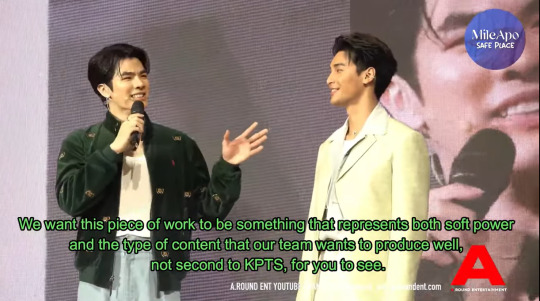
Mile talking about the film on 2022/9/24 at the D7 Grand Opening (vid/txt)

"Nong Po will act with Hia Mile -- please look forward to this movie next year, please look forward to that a lot. We want to expand Thai culture and soft power..." Apo on the Thai period movie at the KPWT Send off on 2022/9/11
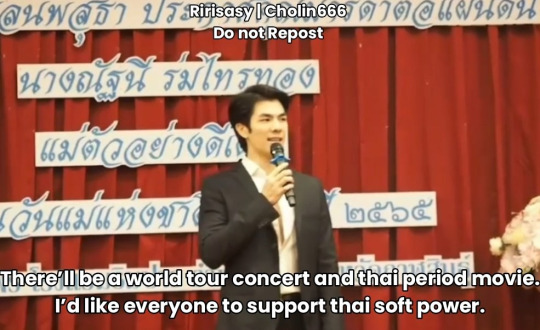
Mile Phakphum's speech on Mother's Day in Kalasin, 2022/8/5
Here's what we do know. Apo's dance training for the film is with a teacher affiliated with the academy that also produces dancers who specifically entertain the royal court.
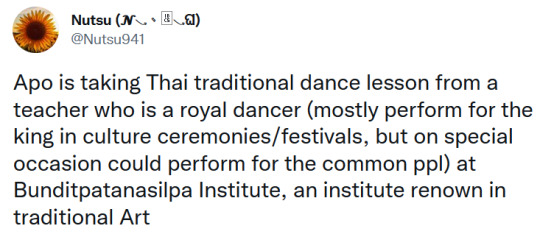
And here is what they individually said in the Vogue Thailand print interview (completed in late August 2022, published October 2022)
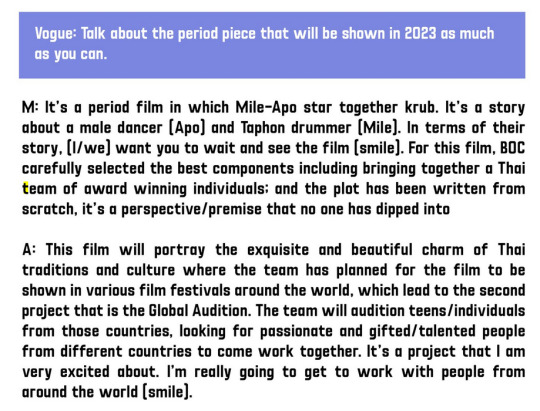
And I would be remiss and dishonest to not point out that Mile's family is prominent in Thailand and his mother is part of the Queen's inner circle. Keep in mind that Thailand is a constitutional monarchy where the monarch has limited powers in practice (think: Japan or UK), and Thailand has a history of cyclical political instability that does not displace the monarchy. So believe him when he says he has limited power compared to Kinn. He travels on a private citizen's passport like all the rest of the cast. (Though my eyes start watering when I'm thinking about baby chaebol CEO Mile and destiny.*)
That being said, what these connections likely did get the production team was access to cultural resources such as the dance expert and most likely credentialed historians to consult on the period film. I would surprised if there aren't ministers' offices who are in the loop about film's production in a way they would not pay to other film or show production teams. I'm sure we will find out more about the interesting and important people involved in the production process around the time the film is released.
Another aspect that stood out to me is the fact that Mile and Apo, neither of whom have policy backgrounds, started iterating the discussion point of soft power in a way you don't see Milli, or Mew Suppassit (who let's not forget was also a RSIFF invitee and the first Thai artist to break into the Billboard World Song Chart), talk about it. Mew actually has talked about soft power a couple of times, but only in the context that he is part of a cultural wave that can increase Thailand's influence globally and never specifically in relation to a project he is promoting. That speaks a lot to the team behind the scenes involved in the writing and consulting (and marketing) process of the 2023 historical film.
The timeline of when these comments popped up is also interesting. While they do coincide with the release of the trailer post KPWT Bangkok, most likely what's happening during this time period is that BOC and more specifically Mile is shopping for sponsors to the project.
Think about Mile speaking about Thailand soft power to an audience of mostly older businesspeople at the mother's day event -- what would the purpose be except an ask for partnership on a project that he is on, which can become a vehicle for Thai products both domestically and globally? Look at the timing of the announcement of the Srichand partnership (end of August), and how successfully that broken the brand into the lucrative Chinese market, moving millions of THB worth of product for a brand that had struggled to get any traction previously. While Srichand's focus is currently on China, working with a Thai beauty brand for a film where the trailer highlighted many historical makeup elements is an actually ideal brand partnership and project alignment.
(Sadly for us, I don't think the film will be the second longest bread commercial in existence. But based on the Farmhouse CEO's comments, I would be unsurprised if they signed on to support the film project too. Ancient Thai bread I guess *jazz hands*)
In Conclusion
MileApo's soft power talking point was an intentional move specifically to shop the film project around for sponsors. The Srichand partnership proved MA-as-a-brand's ability to move product in a lucrative, hard-to-crack foreign market, though Srichand (and Giffarine) as brands aren't necessarily able to stand in the market independently as of yet. Their past brand partnerships' success simultaneously showed how lucrative it is to book MA for a product domestically. I'm sure we'll see a slew of new interesting sponsors and brand partnerships this year. This is only the beginning of MA's power as a cultural brand domestically and internationally.
Mile and Apo have also expressed their pride in the past in being cultural ambassadors of Thailand, both at the RSIFF and when speaking about engaging tourists who are visiting Thailand. Their praise of Thai products (for example, the artistry of Thai silk in the Vogue Th Gala interview) and their active choice to work with mostly Thai brands speaks to their values as businessmen who genuinely want to uplift Thailand's influence in the global market.
That being said, the Thai cultural ministry cannot rely on a single cultural emissary to advance its soft power agenda globally, and as of right now, despite ...some attempts, a cohesive government strategy around soft power does not exist.
MileApo have demostrated their brand has strong impact, and that they can influence purchase behavior internationally (e.g., KPWT ticket sales, Srichand) in ways many Thai media figures have not been able to as of yet. But they are not formally tied to the Thai government, nor should the government intervene and attempt to direct artistic expression.
Culture is one aspect of soft power, and political/humanitarian expression is another major component that advances an international soft power agenda. There are already articles discussing Thailand's problems of political corruption and self/journalistic censorship due to political conditions that prevent full freedom of expression. But that's the government's problem to address that. There is a lot of unharvested potential in multiple realms.
This essay is not about that though. I'm just a fan.
Can it be December 2023 yet 🥺
Additional notes that don't fit into the essay under the cut:
(1) There was a lot of fandom hand-wringing in August and September about Apo publicly having working dinners with Pond over the film project. Let's not forget Mile is someone who cares deeply about the art he makes, and he and Apo both have said multiple times they talk almost nightly about their artistic intent. If Mile talks to Apo and Apo was talking to Pond, why would Mile, a person who cares deeply about art, not be talking to Pond in pre-production? Obviously the answer is a division of labor in the relationship: Mile was working on funding which is just as important, and Mile also needs to sleep and rest and not work. There wouldn't be anyone else he would trust to convey his artistic intent to the director except for Apo. True power couple behavior right there.
(2) * everyday I go feral over baby chaebol CEO Mile. If someone made a kdrama about a handsome chaebol baby who was a CEO but also an actor and model who met his soulmate in university but it was a missed connection and then the soulmate went on to become a famous actor/model who quit because of bullying, but then they met again when the baby chaebol WHO IS STILL A CEO BUT ALSO AN ACTOR met at an audition for a drama... *foams at mouth* I would call this show bizarre, nonsensical and incoherent, and yet HERE WE ARE IN REAL LIFE. The jetsetting supermodel with wealthy CEO part of reality which is now bending around MileApo so they can live their wattpad fanfic life. What the hell am I looking at, I ask myself every day.
(3) ** this statement does not include billionaires like Elon Musk or Jeff Bezos whose net worth exceeds those of small and mid-sized countries. Per today's estimate, ~50 people/families have more wealth than 90 of 190 countries. If your net worth can run the economy of half the countries in the world, then your wealth/resources hoarding behavior can control what the media says and influence otherwise free and fair elections.
Once again, Some of you need some contextualization of how comfortably wealthy vs. billionaire resource-hoarding rich looks like.
#mileapo#mile phakphum#apo nattawin#political science#soft power#international relations#thailand#thailand soft power#kinnporsche#mileapo 2023 film#if you like it give it a reblog#i spent so long on this#like twice as long researching as writing#if people don't like this one i'm gonna fr cry#business analysis#business#business case study#vogue thailand gala#vogue thailand#mileapo x vogue#kinnporsche meta#mileapo meta
599 notes
·
View notes
Text
Underground Empire: Henry Farrell and Abraham Newman's must-read account of "How America Weaponized the World Economy."

I'm coming to Minneapolis! Oct 15: Presenting The Internet Con at Moon Palace Books. Oct 16: Keynoting the 26th ACM Conference On Computer-Supported Cooperative Work and Social Computing.

At the end of Henry Farrell and Abraham Newman's new book Underground Empire, they cite the work of John Lewis Gaddis, "preeminent historian of the Cold War," who dubbed that perilous period "The Long Peace":
https://us.macmillan.com/books/9781250840554/undergroundempire
Despite several harrowing near-misses, neither of the two hair-trigger, nuclear-tipped arsenals were ever loosed. When the Cold War ended, the world breathed a sigh of relief and set about refashioning itself, braiding together economic and social interdependencies that were supposed to make future war unthinkable. Nations that depend on one another couldn't afford to go to war, because they couldn't hurt the other without hurting themselves.
The standard account of the Cold War's "Long Peace" is that the game theorists who invented Mutually Assured Destruction set up a game where "the only way to win was not to play" (to quote the Matthew Broderick documentary War Games). The interdependency strategy of the post-Cold War, neoliberal, "flat" world was built on the same fundamentals: make war more costly than peace, victory worse than the status quo, and war would be over – if we wanted it.
But Gaddis has a different idea. Any effect Mutually Assured Destruction had on keeping fingers from pushing the buttons was downstream of a much more important factor: independence. For the most part, the US and the USSR had nonintersecting spheres of influence. Each of these spheres was self-sufficient. That meant that they didn't compete with one another for the use of the same resource or territory, and neither could put the other in check by seizing some asset they both relied on. The exceptions to this – proxy wars in Latin America and Southeast Asia – were the disastrous exceptions that proved the rule.
But the past forty years rejected this theory. From Thomas Friedman's "World Is Flat" to Fukyama's "End of History," the modern road to peace is paved with networks whose nodes can be found in every country. These networks – shipping routes, money-clearing systems, supply chains, the internet itself – weave together nearly every nation on Earth into a single web of interdependencies that make war impossible.
War, you may have noticed, has become very, very possible. Even countries with their own McDonald's franchises are willing to take up arms against one another.
That's where Farrell and Newman's book comes in. The two political scientists tell the story of how these global networks were built through accidents of history, mostly by American corporations and/or the American state. The web was built by accident, but the spider at its center was always the USA.
At various junctures since the Cold War, American presidents, spies and military leaders have noticed this web and tugged at it. A tariff here, a sanction there, then an embargo. The NSA turns the internet into a surveillance grid and a weapon of war. The SWIFT system is turned into a way to project American political goals around the world – first by blocking transactions for things the US government disfavors, then to cut off access for people who do business with people who do things that the US wants stopped.
Networks tend to centralization, to hubs. These central points are efficient, but (as we learned during the covid lockdown) brittle. One factory fails and an entire category of goods can no longer be made – anywhere. When it comes to global resiliency, these bottlenecks are are a bug; but when it comes to US foreign policy, these chokepoints are a feature.
Farrell and Newman skillfully weave a tale of individuals, powers, circumstances and forces, showing how the rise and rise of world-is-flat rah-rah globalism created a series of irresistable opportunities for "weaponized interdependence." Some players of the game wield these weapons like a scalpel; others (like Trump) use them like a club.
This is a chronicle of the dawning realization – among US power-players and their foreign adversaries, particularly in China – that the US lured its trading partners into entrusting it with financial clearing, IP enforcement, fiber landings, and other chokepoints, on the grounds that American wouldn't risk the wealth these systems generated by turning them into engines of coercion.
But then, of course, that's exactly what America did, from the War on Terror to economic sanctions on Iran, from seizing Argentinian reserves to freezing Russia's cash. Sometimes, the US did this for reasons that I sympathize with, other times, for reasons I am aghast at. But they did it, and did it, and did it.
America's adversaries (and frenemies, like the EU) have tried to build alternative "underground empires" to offset the risk of having their interdependencies weaponized (or to escape from an ongoing situation). But therein lies a conundrum: world-is-flat-ism has ended the age of indepedence. Countries really do need each other – for energy, materials, and finished goods. Independence is a long way off.
To create new interdependency networks, it's not enough for countries to agree that they don't trust America as neutral maintainer of their strategic chokepoints. They also have to agree to trust one of their own to operate those chokepoints. Lots of countries have come to mistrust US dollar-clearing and the SWIFT system – but few are willing to allow, say, China to run an alternative system that carries out settlements in Renminbi. The EU might be able to suck in some "friendly" countries for a Euro-clearing system, but would China trust them? How about Iran?
Farrell and Newman make a good case that US's position at the center of the web is a historical accident, and possibly a one-off, contingent on the ascendant post-Cold War ideology that said that markets and the interdependencies they create would neutralize the threat of handing a rival nation that much power.
Which leaves us in a world of interdependency in conflict. If Gaddis is right and the Long Peace was the result of independence, then this bodes very ill. The only thing worse than a world where no one can depend on anyone is a world where we must depend on entities that are hostile to us, and vice-versa. That way lies a widening gyre of conflict that felt eerily palpable as world events unfolded while I read this excellent, incisive book.
Political science, done right, has the power to reframe your whole understanding of events around you. Farrell and Newman set out a compelling thesis, defend it well, and tell a fascinating tale. And when they finish, they leave you with a way to make sense of things that seem senseless and terrible. This may not make those things less terrible, but at least they're comprehensible.

If you'd like an essay-formatted version of this post to read or share, here's a link to it on pluralistic.net, my surveillance-free, ad-free, tracker-free blog:
https://pluralistic.net/2023/10/10/weaponized-interdependence/#the-other-swifties


My next novel is The Lost Cause, a hopeful novel of the climate emergency. Amazon won't sell the audiobook, so I made my own and I'm pre-selling it on Kickstarter!
#pluralistic#henry farrell#undergound empire#chokepoints#swift#weaponized interdependency#books#reviews#gift guide#political science#new cold war#surveillance#ip#soft power#abraham newman
142 notes
·
View notes
Text
💸🧞♂️🩰🌴🛁🪷🫧🍊🪬🪬🍊🫧🪷🛁🌴🩰🧞♂️💸
my soft power amazes me, i manifest my highest good: health, wealth and happiness.
✨reblog to align✨
#emoji spell#law of attraction#manifesting#manifest#manifesation#soft power#luxury life#suggestion#motivation#my post#emoji spells#abundance mindset#abundance
227 notes
·
View notes
Photo
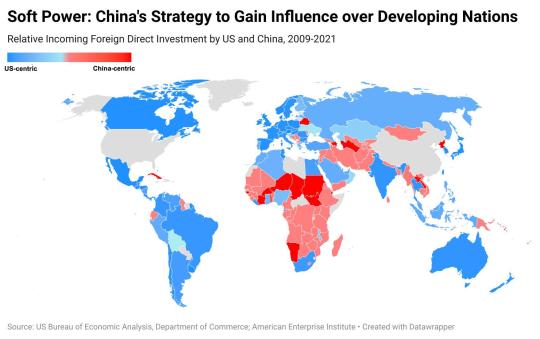
Soft Power: China's Strategy to Gain Influence over Developing Nations
by u/haboo213
90 notes
·
View notes
Photo

Soft Power: The Hypergamous Life.
26 notes
·
View notes
Text
3 Reasons Why Hypergamy Is Life-Changing
Hypergamy is not a new concept. In fact, It’s quite ancient. Socially and economically, hypergamy is the act of “marrying up” or marrying someone from a class or caste superior to your own. It is a historical phenomenon that has existed since the idea of class was conceived in the late 1800s. Evolutionarily though, it is an even older concept. It has always been in the female’s best interest to mate with a male who could help her produce offspring most likely to survive.

Hypergamy Inspires Masculinity — Due to the nature of hypergamy, it naturally calls for a masculine and feminine space, each allowing the other to exist in a complementary way due to the Law of Polarity.
Hypergamy Teaches You Soft Power — Also known as persuasion, attraction, or influence. Although it is typically associated with politics, it is an essential skill to have in your arsenal. We live in a world that is dominated by hard power (punishments and rewards). Hard power, by nature, is masculine. We (femmes), will never win a game where we do not make the rules. So, what must we do? We must change the game completely.
Without Hypergamy, The Odds Aren’t In Your Favor — What do I mean by this? Well, babe, it’s no secret that men benefit the most from marriage. When men marry women, they gain years onto their lives, while the women (who stay married) typically lose years. Unfair, isn’t it? Well, I say, you might as well marry someone who will provide your desired lifestyle while securing a future for your offspring.
Read the full article at www.letssweettalk.com, and don't forget to comment ❤️.
#soft power#hypergamy#divine femininity#dark feminine#sacred feminine#persuasion#marry wealthy#high value dating#high value woman
34 notes
·
View notes
Text
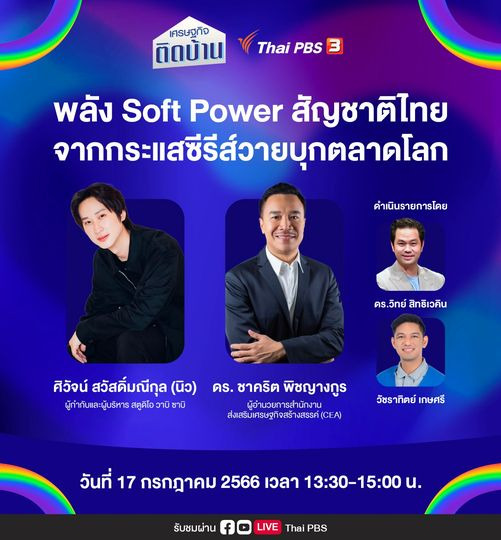
(Autotranslate by Facebook)
When Y Thai Series is becoming famous all over the world, the cultural entertainment power Soft Power is now stepping up to the world leadership. How will the consequences be for both the Thai economy and entertainment industry, and how can industry individuals and public agencies contribute to support and push Y Thai Series to grow.
Discussing 2 perspectives from 2 agencies both serial producers and state agencies with Mr. Sivaj Sawadimanikul (New), Director & CEO of Studio Wabi Sabi, a renowned quality series producer and Dr. Chakrit Pitchyangkun, Director of Creative Economy Promotion Office (CEA)
Running the program with the Dr. Science, Women's Rights and Khun Watcharatit Kesri.
(Original Thai + links))
เมื่อซีรีส์วายไทย กำลังโด่งดังไกลไปทั่วโลก Soft power อันทรงพลังด้านวัฒนธรรมบันเทิงที่ตอนนี้กำลังก้าวขึ้นสู่การเป็นผู้นำของโลก ผลที่ตามมาต่อทั้งเศรษฐกิจและอุตสาหกรรมบันเทิงไทย จะมีข้อผลดีอย่างไร และทั้งบุคคลที่อยู่ในอุตสาหกรรม และหน่วยงานภาครัฐ จะมีส่วนร่วมในการสนับสนุนและผลักดันให้ซ๊รีย์วายไทยเติบโตได้อย่างไร
ร่วมพูดคุยกับ 2 มุมมอง จาก 2 หน่วยงานทั้งผู้ผลิตซีรีย์และหน่วยงานภาครัฐกับ คุณศิวัจน์ สวัสดิ์มณีกุล (นิว) ผู้กำกับและผู้บริหาร สตูดิโอ วาบิ ซาบิ ผู้ผลิตซีรีย์วายคุณภาพที่สร้างชื่อเสียงมาแล้วหลายเรื่อง และดร.ชาคริต พิชญางกูร ผู้อำนวยการสำนักงานส่งเสริมเศรษฐกิจสร้างสรรค์ (CEA)
ดำเนินรายการพร้อมกับ ดร.วิทย์ สิทธิเวคิน และ คุณวัชราทิตย์ เกษศรี
ในวันจันทร์ที่ 17 กรกฎาคม 2566 เวลา 13:30 - 15:00 น.
รับชมได้ผ่านทาง Facebook และ Youtube : Thai PBS
• #เศรษฐกิจติดบ้าน ทุกวันจันทร์-พฤหัสบดี เวลา 21.30 น.
• ชมสด #ThaiPBS#ช่องหมายเลข3
• ชมสดออนไลน์ www.thaipbs.or.th/Live
• ติดตามรายการ www.thaipbs.or.th/Economics101
I just saw this and truly find it amazing to see it discussed. Y'all, we are part of something so much bigger.
#soft power#y series#thai bl#thai bl series#thaibl#asianlgbtqdramas#asian lgbtq dramas#thai bl drama
18 notes
·
View notes
Link
43 notes
·
View notes
Text
There is nothin' wrong with bein' nice
Unless it's just a front to get yourself by
And I can tell
So what the hell
2 notes
·
View notes
Text
I actually showed this to a university class.
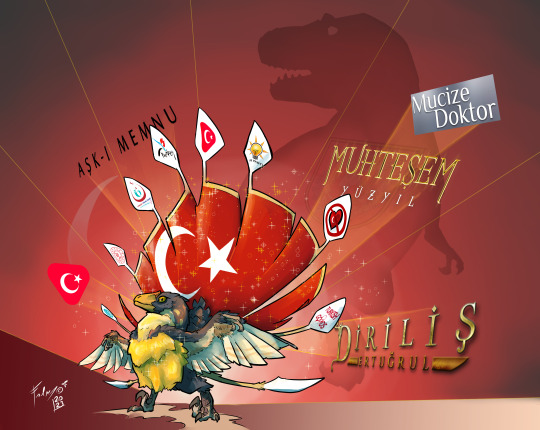

Remember when I said that I ended up watching Magnificent Century due to an assignment?
Well, the thing was about Turkish soft power, and we wanted a good allegory/meme to explain the main concepts.
There wasn't much given that what few soft power cartoons are around center on the US, Russia or China.
Obviously, me being me, I couldn't NOT also make this about dinosaurs.
Btw, the final exam had a question involving this presentation.
#soft power#allegory#political memes#history memes#neo ottomanism#turkish imperialism#imperialism#politics#muhteşem yüzyıl#magnificent memes#ask-i memnu#dinosaurs#tyrannosaurus rex#feathered dinosaurs#dinosaur meme#eddaye#dizilah is a magnificent site#I also put multiple Magnificent Century pics in the slideshow and compared it to Baahubali#and also linked the YT channel in the actual slideshow
12 notes
·
View notes
Note
Dang is Pond on an unofficial redemption tour for himself with all these great talks about BL soft power/censorship? And I saw his post or speech about learning from past mistakes/handlings. Making me like him again….sometimes….as a creative anyway…. Please don’t blow it again sir.
Hey! So it was funny, I was actually talking with @blramblingx2 about the Pond piece yesterday cause they were looking for an opinion from a Pond critic who wasn't foaming at the mouth, and I think the piece was posted right as the other article was blowing up, which was why today's article wasn't included in the write up.
For the ICYMI crowd, here's what I'm talking about:
CEO of Be on Cloud Pond Krisda: Friend or Foe? by @blramblingx2
"How can the government acknowledge that Boy's Love is soft power (for Thailand), but not support it?" from this tweet that was blowing up:
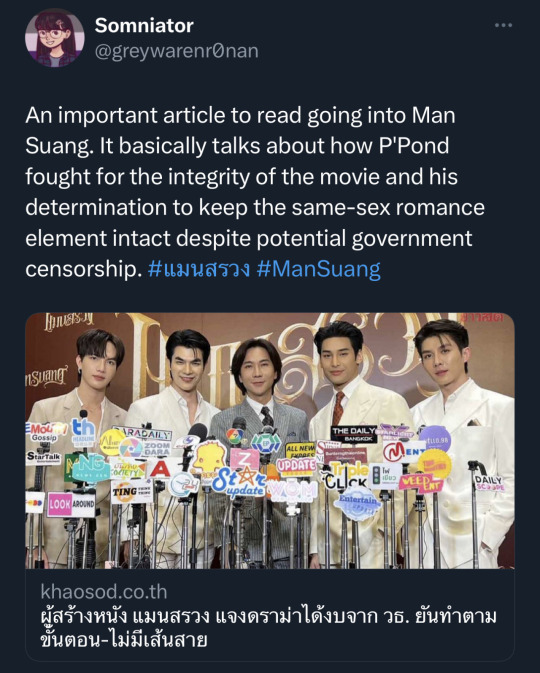
I'm not 100% sure this is a 1-to-1 English version of the article given the breadcrumbs are different and the English version was published two days after the Thai language version, but the title and breadcrumbs had this concerning title: "Thai Director Defends His Government-funded Soft Power Film"
This is what he actually said and where the lede was buried and why I had so many concerns with the English version:
“I would like to emphasize this term ‘soft power’ again, because it is very important. People and the media have referred to or reported on the same-sex series as soft power. However, we have never received support. But today it’s starting. I am getting a little support from the government now, but what I really want is the support of the Thai people, who should no longer classify the film as a same-sex film, but as a good film.”
The financial support is international marketing, not in the production of the film. the Thai government had no say in the actual content being produced, which is where I think a lot of people were concerned that given the recent political situation in Thailand.
I'll say this as a summation, I've never doubted that Man Suang would feature a romance between Chat and Khem. I'm not sure where this recent hand-wringing about whether or not it would be a romance alongside being a mystery/historical film came from.
I've also never had any concerns about the art, or Pond's dedication to furthering the artistic vision while refusing let anything in the way of reflecting queer love in all its facets. See: Pool scene and the production loves its queer audience back.
@moerusai actually expressed concern to me the Pond piece was going to be an apologist piece that would brush his handling of the Build/Poi situation under the rug, and I let Mo know that I did not hold back in my opinion of that being a point where a lot of people who were neutral on Pond felt extreme anger about how poorly he handled that situation and made a mockery of its seriousness while at least appearing to side with Build.
That being said, in terms of Pond learning from his mistakes and his recent comments about reflecting, this is what I said as well:
I think the problem with how fandoms behave these days is there's no room for accepting that actors, people working with them, are also changing, and taking into account that people can grow. The Mew from TharnType is not the same person he is today, and that's OK.
But for many fans, the state of reality became fixed, and no new information can change how you should feel about someone, despite new information becoming available to fans,
So the tl;dr answer to your question is: I'll believe it when I see it, and I hope Pond keep his word.
But I think another key take away from the article is like, it doesn't matter how we as fans feel about Pond. I can be annoyed at him at times, and not care to see his face, but that doesn't warrant the insane and aggressive vitriol that has been directed at him. Like, isn't there enough MileApo content these days to visit and revisit? What is with people and this weird Pond fixation?

37 notes
·
View notes
Text
The reason why c!Dream wanted to control c!Tommy and the reason why so many people wanted him on their side is because c!Tommy has so much soft power, it’s ridiculous. He has it in spades and I don’t think even Cc!Tommy realizes it. Or he does and he didn’t say anything yet. But either way, it explains a lot. My man’s such a great behind the scenes support guy irl and in the story. Holy moly.
Giving his discs for L’Manburg’s freedom? Soft power.
Being Wilbur’s man in the background and handling most of the alliances in L’Manburg and Pogtopia? Soft power.
Being Techno’s right hand man? Soft power.
The final confrontation going the way it did? A combination of his and Tubbo’s soft powers.
My man is literally made of soft power.
I will explain more if you want me to. XD.
12 notes
·
View notes
Text


#ls#fav#alexis ren#aesthetic#soft power#green smoothie girl#manifesting#it girl#that girl#it girl but organic#wild girl aesthetic
77 notes
·
View notes
Text
So, as a long-time fan of Eurovision, and a politics enthusiast from eastern Europe I could sit still and just read horrible comments about Ukraine and their possible win.
Here's the thing, I saw people undermining the Ukrainian entry because of the "pity votes", saying that they would only win because of the /fake/ war (yes, there are people who actually say this), that they don't need the win because it will not help them in any way. Honestly, I'm angry as hell.
Here's the thing, we don't have a clear-cut winner this year, even if we ignore the invasion, Ukraine would still be in the top 5 contenders. So even with all current circumstances, nobody can say who will win.
Starting with the "pity votes issue" because it's the easiest to write about without throwing my laptop into a wall. There are cases when a country tried playing on "pity" votes, the most notable example I can think of off the top of my head is Russia's Julia Samoylova when they played her medical condition and the "Ukrainian discrimination" in the following year. It didn't turn out as well as they hoped.
Ukraine participating in this year's Eurovision is not about scoring "pity votes", it's about soft power. They don't look for pity votes, they look for support and making the issue visible (and don't tell me that already the world knows all about the invasion when there are still people calling it a fake war despite having all the access in the world to information). So even if they get votes because of the invasion, it would be "unconditional support" votes. Soft power (people's support from around the world) is what helped Ukraine gain hard power (weapons).
Another thing that people refuse to acknowledge is just how much of a blow it would be to Russian pride that Ukraine won Eurovision, a contest which they tried so hard to win and have a consistent great track record. Eurovision was one of their main tools to force-wash their image in Europe, and in 2014 when they annexed Crimea they didn't get banned from the contest, they even got a top 10 placement and later a second place with a song about fucking Peace. A win for Ukraine will actually help in this matter.
People also refuse to acknowledge that Ukraine always does well in Eurovision and that kalush brought a song that actually stands up to the pressure and is a great contender for the win. Yes, it's no Go_A with shum, but this is also not 2021 when there was a clear-cut winner and an honest to god bloodbath in the finale. People are basically trying to invalidate their rightful status as a first-place contender because of the invasion.
48 notes
·
View notes
Text
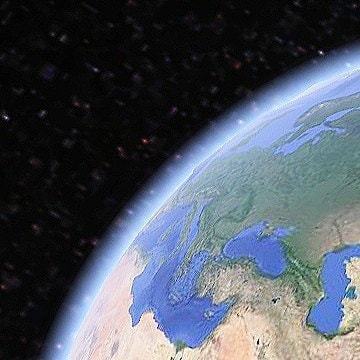
LETTERS FROM AN AMERICAN
August 17, 2023 (Thursday)
HEATHER COX RICHARDSON
Philip Stephens of Financial Times today pointed out how much global politics has changed since 2016. That was the year of Brexit and Trump, when those calling for national sovereignty and iron-bound borders seemed to have the upper hand, and it seemed we were entering a new era in which nations would hunker down and international cooperation was a thing of the past.
But now, just seven years later, international cooperation is evident everywhere. Stephens pointed out that a series of crises have shown that nations cannot work alone. Migrants fleeing the war in Syria in 2015 made it clear that countries must cooperate to manage national borders. Then Covid showed that we must manage health across political boundaries, and then Russia’s invasion of Ukraine proved that European nations—and other countries on other continents—must stand together militarily in their common defense.
That embrace of cooperation is in no small part thanks to President Joe Biden and Secretary of State Antony Blinken, who have focused on bringing together international coalitions.
The new global stance is on display in the U.S. right now as President Biden hosts the first-ever trilateral summit with Prime Minister Fumio Kishida of Japan and President Yoon Suk Yeol of South Korea. This is not an easy meeting—Japan and South Korea have a long history of conflict—but they are working to mend fences* to stand firm against North Korea, including its missile tests, and to present a united front in the face of Chinese power.
Secretary Blinken noted for reporters on Tuesday that the world is currently being tested by geopolitical competition, climate change, Russia’s war of aggression against Ukraine, and nuclear aggressions. “Our heightened engagement is part of our broader efforts to revitalize, to strengthen, to knit together our alliances and partnerships—and in this case, to help realize a shared vision of an Indo-Pacific that is free and open, prosperous, secure, resilient, and connected,” he said. “And what we mean by that is a region where countries are free to chart their own path and to find their own partners, where problems are dealt with openly, where rules are reached transparently and applied fairly, and where goods, ideas, and people can flow lawfully and freely.”
Cooperation between Japan and South Korea “helps us promote peace and stability and furthers our commitment to the complete denuclearization of the Korean Peninsula. It advances our shared values and helps uphold principles of the UN Charter like sovereignty, independence, territorial integrity. It allows us to even more expand opportunity and prosperity.”
Blinken addressed Ukraine’s resistance to the Russian invasion, backed by an international coalition, and reiterated that Ukrainians are upholding “the basic principles—sovereignty, territorial integrity, independence—that are vital to maintaining international peace and security.”
In squeezing Russia, international cooperation has again been vital. The Swiss corporation Société Internationale de Télécommunications Aéronautiqes (SITA), which is responsible for booking, flight messaging, baggage tracking, and other airline applications, announced in May that it will leave Russia this autumn. Russian carriers are scrambling.
Blinken also confirmed that the Biden administration last week achieved a deal with Iran over U.S. prisoners. Iran moved four dual citizens from the infamous Evin Prison to house arrest, and the U.S. is working to get them, along with one more who was already under house arrest, home. In exchange, the U.S. will release several Iranian prisoners along with $6 billion of Iranian oil revenue currently held in South Korea.
Several Republicans have opposed that deal. The senior Republican on the Senate Foreign Relations Committee, James E. Risch of Idaho, said that the “unfreezing” of funds “incentivizes hostage taking & provides a windfall for regime aggression,” and Senator Tom Cotton (R-AR) called the money “ransom” and said it was a “craven act of appeasement.”
But in an op-ed on the national security website Defense One, Ryan Costello, the policy director for the National Iranian American Council, called the deal a win-win. The Iranian money will be released to Qatar, which will release it for purchases of food and medicine, which are not sanctioned. Medicine is desperately needed in Iran, and as Biden said in 2020: “Whatever our profound differences with the Iranian government, we should support the Iranian people.”
In his remarks to reporters on Tuesday, Blinken defended the administration's withdrawal from Afghanistan almost exactly two years ago, saying the decision to withdraw was “incredibly difficult” but correct. “We ended America’s longest war,” he said. “For the first time in 20 years, we don’t have another generation of young Americans going to fight and die in Afghanistan. And in turn, that has enabled us to even more effectively meet the many challenges of our time, from great power competition to the many transnational issues that we’re dealing with that are affecting the lives of our people and people around the world.”
He noted that the U.S. continues to be the leading donor of humanitarian assistance to Afghanistan, contributing about $1.9 billion since 2021, and that the U.S. continues to work to hold the Taliban accountable for the rights of women and girls.
In Niger, a key U.S. ally in Africa against terrorism, military forces took power from the democratically elected president on July 26, and now the Economic Community of West African States (ECOWAS), a regional union of fifteen countries, has said it will intervene militarily if diplomatic efforts to restore President Mohamed Bazoum to power fail. Army chiefs met today in Ghana to discuss creating a standby force. Nigeria’s chief of defense staff, General Christopher Gwabin Musa, told the meeting: “The focus of our gathering is not simply to react to events, but to proactively chart a course that results in peace and promote[s] stability."
Blinken said Tuesday that the U.S. strongly supports the efforts of ECOWAS to restore Niger’s constitutional order, but the African Union apparently opposes intervention out of concern that such intervention might trigger a civil war.
Meanwhile, in Sudan, where the Biden administration hoped working with two rival generals would pressure them to restore civilian democracy, the country has been torn apart as those two generals now vie for power. Days ago, the U.S. government warned of corruption and human rights violations in South Sudan, with one of the rival military forces, the Rapid Support Forces, apparently engaging in widespread targeted killing and sexual violence in the western Sudan region of Darfur.
Yesterday, the State Department called for the two factions to stop fighting. “Every day this senseless conflict continues, more innocent civilians are killed, wounded, and left without homes, food, or livelihoods. The parties must end the bloodshed. There is no acceptable military solution to this conflict,” it said.
—
*The expression “mending fences” appears to come from U.S. Senator John Sherman (R-OH), who in 1879 told reporters he had to go home to take care of his farm (including mending his fences) when everyone had a pretty shrewd idea he was trying to repair political relationships to shore up support, hoping for a presidential nomination. (It didn’t work: his chief manager was Representative James A. Garfield (R-OH), who ended up getting the nomination himself.)
LETTERS FROM AN AMERICAN
HEATHER COX RICHARDSON
#foreign policy#the changing world#Letters from an american#Heather Cox richardson#political#Blinken#Biden#leadership#mending fences#diplomacy#soft power
2 notes
·
View notes
Text
ทัวร์ลงในคอมเม้น View this post on Instagram
#drama#soft power#Thai food#Thailand#Bangkok#food#recipe of the day#master chief#Thai restaurant#Instagram#street food#cooking#cook#shrimp#animal#salad#green#healthy living
1 note
·
View note